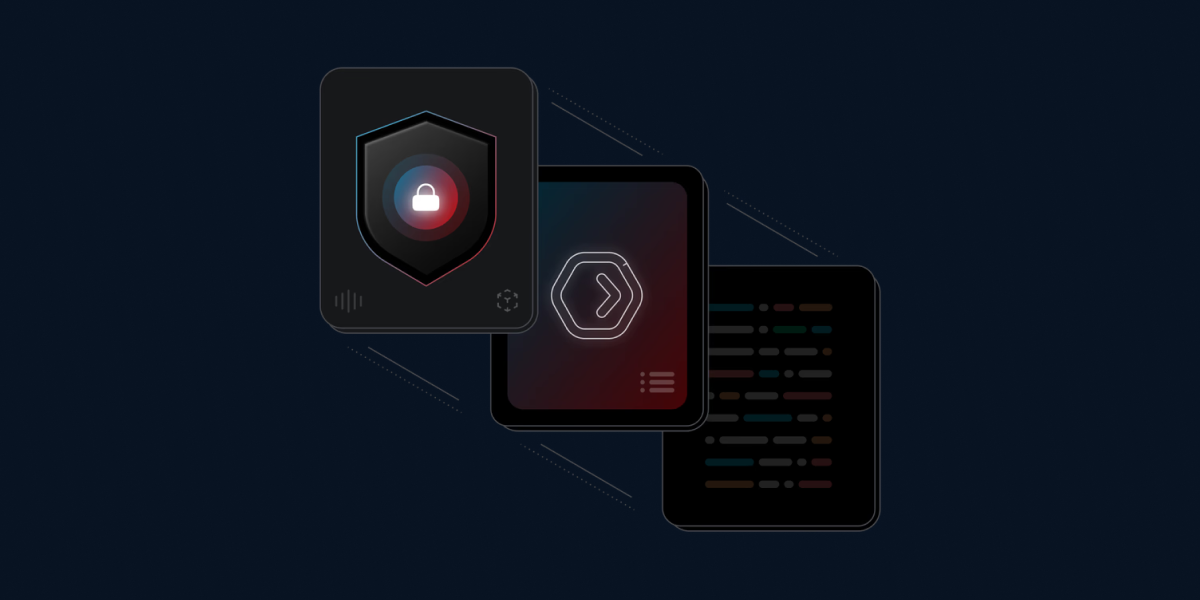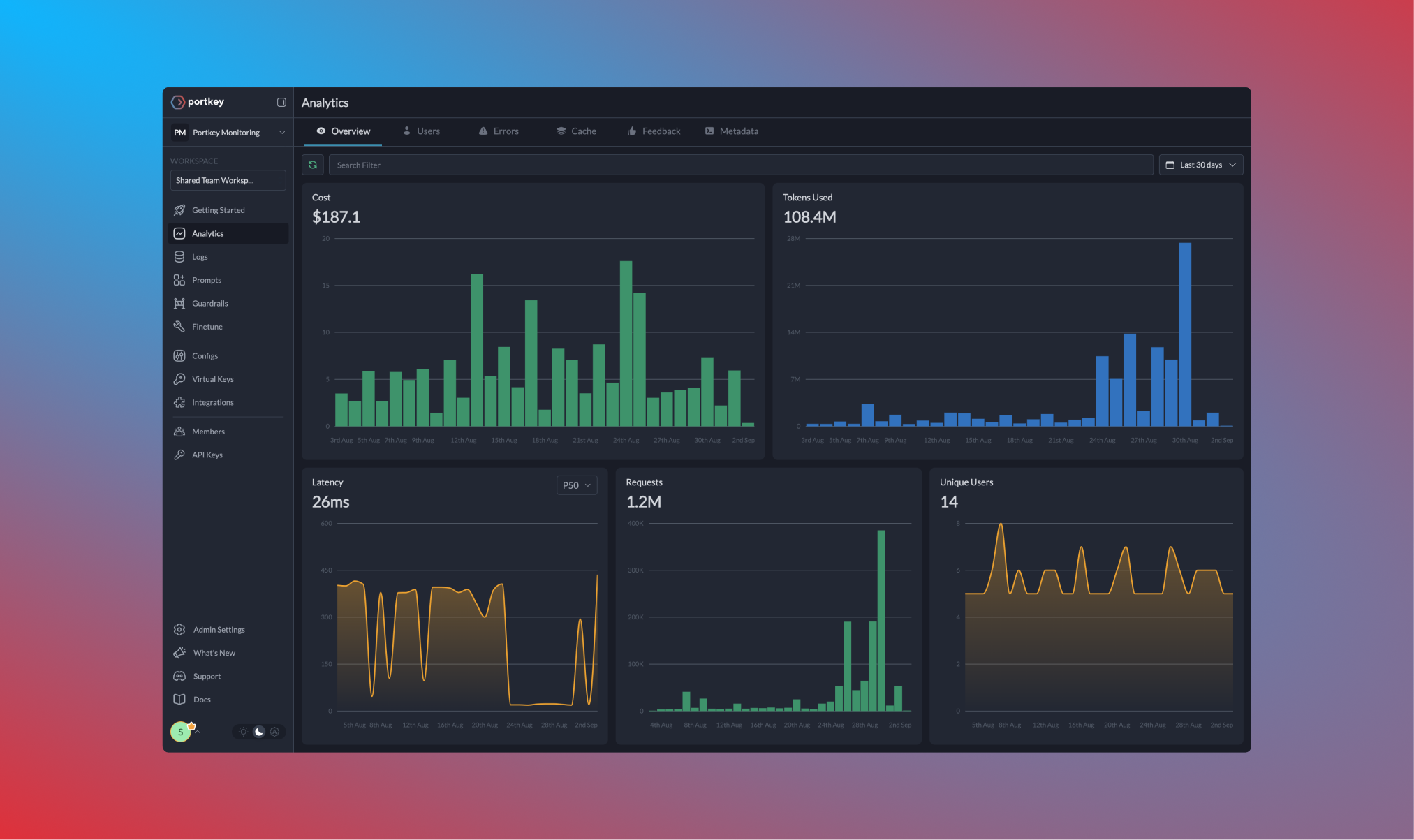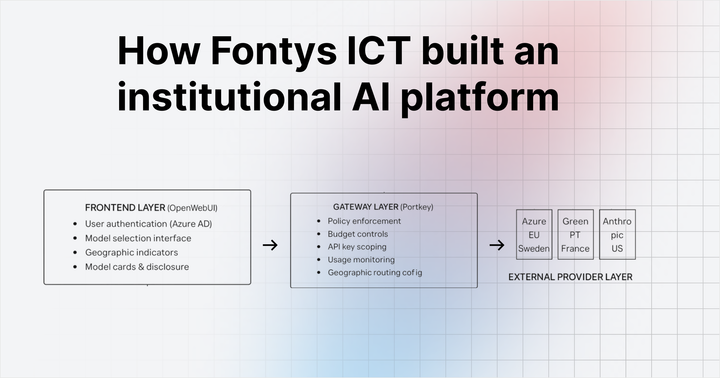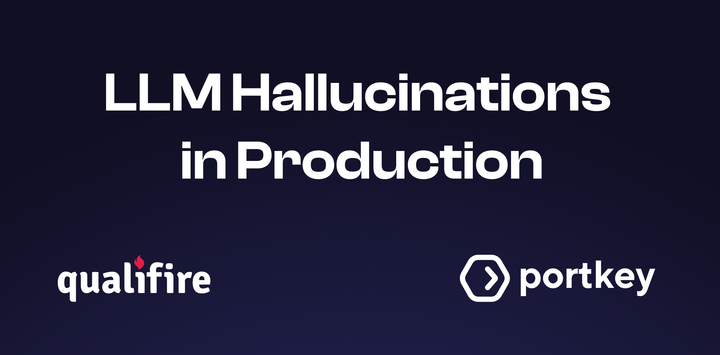Bridging the Gap: How Portkey AI Gateway Connected with MongoDB Helps Productionize AI Apps
Portkey’s open-source AI Gateway is used by thousands of AI companies to take their apps to production. Learn how these companies tackle crucial LLM challenges and build apps that delight users.

Portkey’s open-source AI Gateway is used by thousands of AI companies to take their apps to production. Learn how these companies tackle crucial LLM challenges and build apps that delight users.
Executive Summary
This article explores how AI Gateways are revolutionizing the deployment of AI applications in production environments. Key points include:
- Common challenges in transitioning AI from prototype to production
- How AI Gateways address these challenges through unified APIs, intelligent routing, and comprehensive monitoring
- Key features of AI Gateways and their business impact
- A real-world case study demonstrating the transformative power of AI Gateways
- Steps for tech executives to implement AI Gateways in their organizations
Introduction
In the fast-paced world of artificial intelligence, the journey from an innovative AI prototype to a robust, production-ready application is often fraught with unexpected challenges. As a tech executive, you've likely experienced the excitement of a promising AI proof-of-concept, only to face a daunting array of obstacles when pushing it to production. This is where the powerful combination of AI Gateways and MongoDB comes into play.
Consider this scenario: Your team has developed a cutting-edge chatbot using the latest LLM. It performs brilliantly in controlled environments, but as you prepare to deploy it at scale, you're confronted with several challenges:
- Cost Management and Visibility:
Challenge: AI operations can be expensive, with costs varying significantly across different models and providers.
Impact: Without clear visibility, businesses risk budget overruns and inefficient resource allocation. - Model Flexibility and Adaptation:
Challenge: The AI ecosystem evolves rapidly, with new, more efficient models constantly emerging.
Impact: Staying competitive requires frequent evaluations, but integrating and testing new models is time-consuming and resource-intensive. - Operational Complexity:
Challenge: Traditional DevOps tools fall short for AI applications, making debugging and monitoring difficult.
Impact: Issues in production can be hard to diagnose and resolve, leading to extended downtimes and user dissatisfaction. - Security and Compliance:
Challenge: LLM outputs aren't always reliable or compliant with data protection regulations.
Impact: Without robust safeguards, businesses risk data breaches, legal issues, and damage to their reputation. - Scalability and Performance:
Challenge: AI models can struggle under high load or with diverse input types.
Impact: Poor performance at scale can negate the benefits of AI implementation and frustrate users. - Data Management and Scalability:
Challenge: AI applications generate and require access to vast amounts of data, including logs, telemetry, and vector embeddings.
Impact: Without a robust and scalable database solution, businesses struggle with data storage, retrieval, and analysis, hindering the AI application's performance and growth. - Vendor Lock-in:
Challenge: Deep integration with a single AI provider can make it difficult to switch or use multiple providers.
Impact: Businesses may miss out on innovations from other providers or face higher costs due to lack of competition.
These challenges are not unique. In fact, they represent a common stumbling block for businesses aiming to leverage AI technologies effectively. The gap between AI prototypes and production-ready applications is wide, often leading to delayed projects, exceeded budgets, or even abandoned initiatives.
However, a solution is rapidly gaining traction among forward-thinking companies: AI Gateway Connected with MongoDB. With the right approach and tools, these hurdles can be overcome, allowing you to harness the full potential of your AI investments.
AI Gateway + MongoDB: The Bridge to Production-Ready AI
An AI Gateway is a powerful middleware solution that acts as a key middleware between your applications and various AI models and providers. Think of it as a universal adapter for your AI needs, simplifying integration, enhancing control, and providing a layer of abstraction that addresses many of the challenges we've discussed.
MongoDB, on the other hand, is a flexible, scalable, and high-performance database platform that complements AI Gateways perfectly. It provides a robust solution for storing and managing the vast amounts of data generated by AI applications, including logs, telemetry, and vector embeddings.

Key Features of AI Gateways
- Unified API and Provider Management
What it does: Provides a single, consistent interface to interact with multiple AI models and providers.
Business impact: Dramatically reduces development time and costs associated with integrating and switching between different AI services. - Intelligent Load Balancing and Failover
What it does: Distributes requests across multiple API keys or providers and automatically switches to backup models if the primary model fails.
Business impact: Ensures high availability, consistent performance, and optimal resource utilization, even during traffic spikes or service disruptions. - Cost Optimization and Visibility
What it does: Offers detailed insights into AI usage, costs, and performance across different models and providers.
Business impact: Enables data-driven decisions to optimize AI spending and improve ROI. - Advanced Security and Compliance Controls
What it does: Implements content filters, output validation, and data privacy measures.
Business impact: Mitigates risks associated with AI misuse, ensures compliance with regulations, and protects sensitive information. - Comprehensive Observability
What it does: Provides detailed logs, performance metrics, and debugging tools specifically designed for AI operations.
Business impact: Speeds up issue resolution, improves system reliability, and facilitates continuous improvement of AI applications. - Prompt Management and Versioning
What it does: Centralizes prompt storage, versioning, and optimization.
Business impact: Enhances collaboration, ensures consistency across applications, and allows for rapid iteration without code changes.
By leveraging these features, businesses can significantly streamline their AI operations, reduce time-to-market for new AI-powered features, and maintain a competitive edge in the rapidly evolving AI landscape.
MongoDB's Role in AI Application Deployment
MongoDB complements AI Gateways by providing:
- Flexible Data Model: Adapts to various data types and structures common in AI applications.
- Scalability: Easily handles growing volumes of AI-generated data.
- High Performance: Ensures quick data retrieval and storage, crucial for real-time AI applications.
- Native Vector Search: Supports efficient similarity searches for AI models.
- Robust Security: Offers enterprise-grade security features to protect sensitive AI data.
By leveraging these features, businesses can significantly streamline their AI operations, reduce time-to-market for new AI-powered features, and maintain a competitive edge in the rapidly evolving AI landscape.
Portkey: A Comprehensive AI Gateway Solution with MongoDB Integration
Portkey is an open-source AI Gateway solution designed to address the challenges of deploying AI applications at scale. With its robust feature set and user-friendly interface, Portkey has become the go-to choice for thousands of AI companies looking to streamline their AI operations. What sets Portkey apart is its seamless integration with MongoDB, offering a complete solution for AI application deployment and management.

Let's explore how Portkey, in conjunction with MongoDB, addresses each of the production hurdles:
- Simplified Integration:
Portkey offers an easy setup process: npx @portkey-ai/gateway for self-hosted solutions, or a simple sign-up for the hosted version. With a unified API, your development team can integrate multiple AI providers with minimal code changes, significantly reducing development time and complexity. MongoDB's flexible schema allows for easy storage and retrieval of diverse AI-related data. - Intelligent Request Routing:
Portkey's load balancing feature automatically distributes requests across multiple API keys or providers, optimizing for cost, performance, or both. The fallback mechanism ensures high availability by automatically switching to backup models if the primary model fails, maintaining uninterrupted service. MongoDB's high-performance read and write operations support this real-time decision making. - Cost Control and Visibility:
Gain comprehensive insights into your AI operations with Portkey's detailed logs and performance metrics, all efficiently stored and queried in MongoDB. Monitor costs, latency, and usage across different models and providers, enabling data-driven decisions to optimize your AI investments. - Enhanced Security:
Implement robust content filters and output validation to ensure AI responses meet your quality and safety standards. Protect against potential misuse or inappropriate content, helping maintain your company's reputation and compliance with regulations. MongoDB's security features, including field-level encryption, further safeguard sensitive AI data. - Advanced Debugging:
Access request-level cost data and performance metrics, simplifying the debugging process for AI applications. Set up automatic retries for failed requests, improving reliability without complicating your application logic. MongoDB's powerful querying capabilities allow for quick analysis of log data, facilitating rapid issue resolution.Flexible Prompt Management:
Centralize and version control your prompts, allowing for easy updates and optimization without changing application code. This feature is particularly valuable for large teams or companies managing multiple AI-powered applications.
By leveraging Portkey's comprehensive features integrated with MongoDB's robust data platform, businesses can focus on innovating and creating value with AI, rather than getting bogged down by the complexities of integration, scaling, and management.Explore Portkey’s integration docs with MongoDB here.
Real-World Impact: AI Gateway in Action
To illustrate the transformative power of AI Gateways, let's consider the case of Quizizz, one of the most popular edtech platforms deployed in over 90% of US schools.
Challenge: Quizizz was developing an AI-powered service for teachers to easily consume course material and create quizzes and lessons. When using vision models from leading LLM providers, they struggled with high downtimes, performance issues, and long response times.
Solution: Quizizz implemented Portkey's AI Gateway, which allowed them to:
- Unify API calls to multiple AI providers through a single interface.
- Tackle stringent rate limits with intelligent load balancing.
- Implement automated failover to different models when the primary model fails.
- Gain detailed insights into costs and performance across different models.
Results:
- 100% visibility over AI app operations, enabling rapid debugging
- 99.99% uptime for AI-powered features by addressing rate limit and LLM failure errors
- 40+ real-time AI metrics providing deep insights into app performance
- Ability to quickly test and integrate new AI models as they become available
By leveraging an AI Gateway, Quizizz transformed their AI operations from a source of frustration to a competitive advantage, allowing them to focus on innovation and customer satisfaction.
Conclusion: Embracing the Future of AI Operations
As we've explored, the journey from AI prototype to production-ready application is fraught with challenges. However, AI Gateways are emerging as a game-changing solution, bridging the gap between innovation and implementation.
Key benefits of adopting an AI Gateway include:
- Streamlined Development: Accelerated time-to-market for AI-powered features
- Enhanced Reliability: Consistent performance and high availability
- Optimized Costs: Data-driven decisions to maximize ROI
- Improved Security: Mitigated risks associated with AI deployment
- Future-Proofing: Easy integration of multiple AI providers
In the rapidly evolving AI landscape, staying competitive means leveraging the latest models efficiently, securely, and at scale. AI Gateways, like Portkey, provide the infrastructure needed to turn AI investments into tangible business advantages.
As a tech executive, the question is no longer whether to adopt AI, but how to do so most effectively. By implementing an AI Gateway, you're laying the foundation for a future where AI is a seamless, reliable, and cost-effective part of your technology stack.
Taking the Next Step
Ready to transform your AI operations?
- Assess your current AI infrastructure and identify pain points.
- Explore AI Gateway solutions, considering ease of integration, feature set, and scalability.
- Start with a pilot project to experience the benefits firsthand.
- Consider Portkey's AI Gateway for a comprehensive, battle-tested solution.
Remember, in the world of AI, it's not just about having the most advanced models – it's about deploying them effectively. An AI Gateway could be the key to unlocking the full potential of your AI initiatives.
Ready to experience the benefits of Portkey's AI Gateway? Sign up for a free trial or join our community of AI practitioners to learn more and get started.



